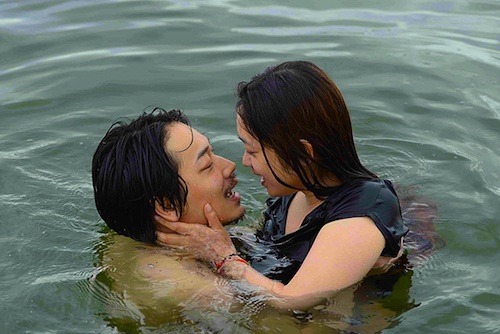By Joe Bendel. Shortly after his 1989 source novel was published, author Yasushi Sato took his own life. Clearly, it did not sufficiently cheer him up. Decades later, director Mipo O has helmed a big screen adaptation, showing a pronounced empathy for that sort of dark and depressed state of being, despite her reputation for light comedy. Life is nasty and brutish for two young lovers. Any respite they find in each other’s arms will be paid for on credit with future misery in O’s The Light Shines Only There, which screens as a selection of this year’s Japan Cuts, the Festival of New Japanese Film in New York.
Tatsuo Sato has basically given up living. He shambles through the streets and pachinko parlors of the blighted Hokkaido port town of Hakodate like a zombie. Yet, for some strange reason, Takuji Oshiro will not stop talking to him. Somehow, he even drags Sato back to his family’s beach shack, where his put-upon sister Chinatsu serves them lunch, without a smile. Nonetheless, there is a bit of something that passes between her and Sato. It is even there when he drunkenly stumbles into the bar where she works as a “hostess.”
Despite several false starts, Sato and Oshiro become lovers, at least as best they can. It is safe to say they both have severe intimacy issues. Further complicating matters, the local mobbed up squid factory owner considers her his personal property. He is a violent lover, but she is stuck with his abuse, because he is the guarantor for her brother’s parole.
So, happy times. Nevertheless, it is hard to truly be depressed by a film so well acted and executed. As Chinatsu Oshiro, Chizuru Ikewaki is a staggering revelation. While in real life she is quite stunning, for Light she is glammed down and bedraggled to truly look like a cast-aside victim of life’s rottenness. Her performance is brave as hell and relentlessly honest, forcing us to watch the explicit realities of those who subsist in the margins of polite society.

By design, it is much harder to draw a bead on Gou Ayano’s distant Sato, at least until his former boss from the stone quarry (nicely played with gruff sensitivity by Shohei Hino) arrives to fill in some backstory. As annoying as his character might be, Masaki Suda’s Takuji ultimately provides the film’s tragic heart.
For the purposes of easy symbolic short-hand, water is often associated with purification, but not in Light. Instead, screenwriter Ryo Takada’s adaptation of Yasushi Sato’s novel contrasts the healthy cleanliness of the mountains where Tatsuo Sato once worked, with the predatory corruption of the beachfront town.
It is potent stuff, but absolute Kryptonite for the Academy, who declined to nominate Light in the foreign language category, even though Japan duly submitted it. They would have much better award season luck with a classy historical. On the other hand, this is a film that will speak to young and disillusioned audiences much more directly for years to come. Driven by Ikewaki’s frighteningly frank performance, The Light Shines Only There is recommended for those who appreciate uncompromisingly naturalistic drama. It screened this past Wednesday (7/15) at the Japan Society, as part of the 2015 Japan Cuts.
LFM GRADE: A-
Posted on July 16th, 2015 at 11:04pm.